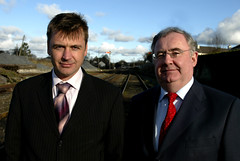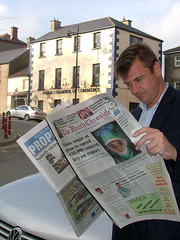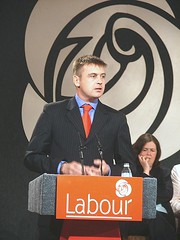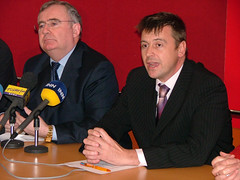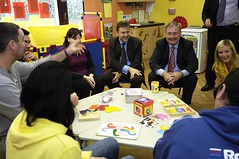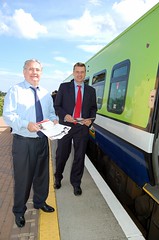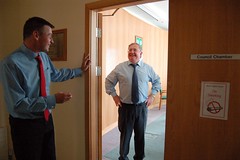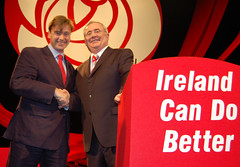Friday, July 25, 2008
Senator Alan Kelly to run for Munster
We flew out of Tanzania on Sunday to Entebbe in Uganda. On the way we stopped briefly at Kilimanjaro airport. I could see the snow-covered peak as we came in to land. It brought back bitter-sweet memories of my time at the summit on New Year's Day.
Entebbe lies on the shore of Lake Victoria. It used to be the capital of Uganda, before it was moved 40km away to Kampala in the '70s. It’s probably best known for the daring raid by Israeli commandos to free the hostages held there by German and Palestine hostage-takers. The hostages had been on their way from Tel Aviv to Paris before the Aer France plane was hijacked. The plane was abandoned at the airport and can still be seen on the runway today.
The visit kicked off with a briefing session in the Irish Embassy by the Ambassador and his staff to set the scene for our visit.
Our first meeting was with the Minister of internal Affairs (akin to our Minister for Justice). We asked him about questions in relations to domestic violence and internal security. Amnesty International has some concerns about the rights of gay people in the country, so I took the opportunity to ask him at first hand for his thoughts. His response was that the country will have to move slowly on these matters. He believes that their society has difficulties with any legislation, because of beliefs embedded in the culture, and that further education is needed before the politicians can move. Micheal D made the point that human rights are sacrosanct and that politicians need to show leadership on these issues.
All in all it was a constructive meeting, with a healthy exchange of views. I’m not sure how much we influenced the Minister, but was did impress me was that he was very open to discussion on all of the points we raised.
The Irish aid program provides assistance for a local Aids organisation called TASO. We visited one of their centres in Kampala and were given a tour of the operation. They deal with hundreds of people on a daily basis, providing medical assistance in the form of Anri-retroviral therapy as well as counselling support.
At lunch in the embassy we were joined by several guests including the Ambassadors from Denmark and Holland, as well as the Chief Executive of the Human Rights Commission in Uganda. We had a round table discussion about the international aid effort in Uganda, and how the country is responding to this.
Afterwards we visited a local program which seeks to counter the incidences of domestic violence. There are some huge statistics for the amount of women who suffer violence in the home. Our aid program focuses on the education of males in society. We met about twenty of them whose role is to spread awareness within society on the issue, with the aim of reducing the scale of the problem. The organisation pointed out that they lack a shelter for abused mothers to stay in. Perhaps this is something that our aid program can help with in the future.
The following morning we travelled from the capital up to the Karamojo region, which lies in the north eastern part of Uganda. It’s one of the poorest parts of the country, with low educational involvement.
We travelled up to the Moroto district by plane and were met at the landing strip by some of the local politicians, council officials and an assortment of dancers, educationalists and singers. There was also a strong presence of armed military personnel. There is ongoing strife in the region and many of the males live away from their homes in travelling gangs.
Our aid program here is focused on education and we have provided assistance to two local secondary schools. We visited one and had a chat to three students who are receiving bursaries from the Irish aid program. One of the students explained that he was the only one of his family to go to secondary school. His described his two brothers as “warriors”. Without our help he would most likely be carrying around an AK47, rather than books on calculus.
The “warriors” travel around the villages in the area, protecting their own but also raiding others. We visited a couple of them. They are designed with security in mind: in a circle with large wooden walls running around the outside. Directly inside the walls are the small hits that families live in. Further inside, in the inner circle of the enclosure, there is space for the animals to be kept (typically pigs, chickens and cows).
The area has suffered significant drought over the last few years, and because of this and the hardships caused by the ongoing feuds, there is little food. We looked into some of the storage vessels and there was not a grain of food in there. In one of the villages there were no livestock – they has died, been eaten or sold. We also saw the depressing sight of children picking ants out of a molehill for food. Hunger was very evident, with lots of children walking around with distended stomachs
We left some medicines and food items with the villagers, but in truth it was just a drop in the ocean. I’ve never seen poverty at this scale or so close before. Unfortunately, the hunger here is caused by a number of factors, mainly drought and war. Both of these can’t be solved easily.
On our return to Kampala I left for the flight back to Dublin. Once again, I was hugely impressed by the organisational abilities of our local embassy staff, as well as the kindness and affection shown to us by the local people. At every meeting the Ugandans asked us to remind people back home how grateful they are for our help. It’s a very tough country for the people living there, but we certainly saw many instances of how the Irish aid program is helping to build hope across the country.
After a few days catching up with some local matters I headed off to Cork, where the convention to select our European election candidate for the Ireland South constituency (in effect Munster) took place on Saturday. I turned up at the Silver Springs hotel just after lunch. Even though it where was still an hour to go before kick-off there was already a sizeable crowd building. The two candidates for the nomination were my colleagues Senator Alan Kelly from Portroe in Tipperary and Arthur Spring from Kerry.
The hall filled up and there were over 500 people in attendance by the time the Party Leader spoke. He was followed by each of the candidates and then the voting took place upstairs. As a Leinster man I didn't have a vote, but it was clear to many that Alan was going to do it. For Arthur to win he needed a high turnout from the Kerry contingent. However, from looking at the numbers voting it appears that no more than 100 turned up from the Kerry constituencies. As it transpired, Alan won the day by 276 votes to 144.
The contest not only raised the profile of both candidates, but it also gives Alan a resounding vote of confidence as he starts his campaign proper. It'a tough task but if anyone can do it Alan can!
Entebbe lies on the shore of Lake Victoria. It used to be the capital of Uganda, before it was moved 40km away to Kampala in the '70s. It’s probably best known for the daring raid by Israeli commandos to free the hostages held there by German and Palestine hostage-takers. The hostages had been on their way from Tel Aviv to Paris before the Aer France plane was hijacked. The plane was abandoned at the airport and can still be seen on the runway today.
The visit kicked off with a briefing session in the Irish Embassy by the Ambassador and his staff to set the scene for our visit.
Our first meeting was with the Minister of internal Affairs (akin to our Minister for Justice). We asked him about questions in relations to domestic violence and internal security. Amnesty International has some concerns about the rights of gay people in the country, so I took the opportunity to ask him at first hand for his thoughts. His response was that the country will have to move slowly on these matters. He believes that their society has difficulties with any legislation, because of beliefs embedded in the culture, and that further education is needed before the politicians can move. Micheal D made the point that human rights are sacrosanct and that politicians need to show leadership on these issues.
All in all it was a constructive meeting, with a healthy exchange of views. I’m not sure how much we influenced the Minister, but was did impress me was that he was very open to discussion on all of the points we raised.
The Irish aid program provides assistance for a local Aids organisation called TASO. We visited one of their centres in Kampala and were given a tour of the operation. They deal with hundreds of people on a daily basis, providing medical assistance in the form of Anri-retroviral therapy as well as counselling support.
At lunch in the embassy we were joined by several guests including the Ambassadors from Denmark and Holland, as well as the Chief Executive of the Human Rights Commission in Uganda. We had a round table discussion about the international aid effort in Uganda, and how the country is responding to this.
Afterwards we visited a local program which seeks to counter the incidences of domestic violence. There are some huge statistics for the amount of women who suffer violence in the home. Our aid program focuses on the education of males in society. We met about twenty of them whose role is to spread awareness within society on the issue, with the aim of reducing the scale of the problem. The organisation pointed out that they lack a shelter for abused mothers to stay in. Perhaps this is something that our aid program can help with in the future.
The following morning we travelled from the capital up to the Karamojo region, which lies in the north eastern part of Uganda. It’s one of the poorest parts of the country, with low educational involvement.
We travelled up to the Moroto district by plane and were met at the landing strip by some of the local politicians, council officials and an assortment of dancers, educationalists and singers. There was also a strong presence of armed military personnel. There is ongoing strife in the region and many of the males live away from their homes in travelling gangs.
Our aid program here is focused on education and we have provided assistance to two local secondary schools. We visited one and had a chat to three students who are receiving bursaries from the Irish aid program. One of the students explained that he was the only one of his family to go to secondary school. His described his two brothers as “warriors”. Without our help he would most likely be carrying around an AK47, rather than books on calculus.
The “warriors” travel around the villages in the area, protecting their own but also raiding others. We visited a couple of them. They are designed with security in mind: in a circle with large wooden walls running around the outside. Directly inside the walls are the small hits that families live in. Further inside, in the inner circle of the enclosure, there is space for the animals to be kept (typically pigs, chickens and cows).
The area has suffered significant drought over the last few years, and because of this and the hardships caused by the ongoing feuds, there is little food. We looked into some of the storage vessels and there was not a grain of food in there. In one of the villages there were no livestock – they has died, been eaten or sold. We also saw the depressing sight of children picking ants out of a molehill for food. Hunger was very evident, with lots of children walking around with distended stomachs
We left some medicines and food items with the villagers, but in truth it was just a drop in the ocean. I’ve never seen poverty at this scale or so close before. Unfortunately, the hunger here is caused by a number of factors, mainly drought and war. Both of these can’t be solved easily.
On our return to Kampala I left for the flight back to Dublin. Once again, I was hugely impressed by the organisational abilities of our local embassy staff, as well as the kindness and affection shown to us by the local people. At every meeting the Ugandans asked us to remind people back home how grateful they are for our help. It’s a very tough country for the people living there, but we certainly saw many instances of how the Irish aid program is helping to build hope across the country.
After a few days catching up with some local matters I headed off to Cork, where the convention to select our European election candidate for the Ireland South constituency (in effect Munster) took place on Saturday. I turned up at the Silver Springs hotel just after lunch. Even though it where was still an hour to go before kick-off there was already a sizeable crowd building. The two candidates for the nomination were my colleagues Senator Alan Kelly from Portroe in Tipperary and Arthur Spring from Kerry.
The hall filled up and there were over 500 people in attendance by the time the Party Leader spoke. He was followed by each of the candidates and then the voting took place upstairs. As a Leinster man I didn't have a vote, but it was clear to many that Alan was going to do it. For Arthur to win he needed a high turnout from the Kerry contingent. However, from looking at the numbers voting it appears that no more than 100 turned up from the Kerry constituencies. As it transpired, Alan won the day by 276 votes to 144.
The contest not only raised the profile of both candidates, but it also gives Alan a resounding vote of confidence as he starts his campaign proper. It'a tough task but if anyone can do it Alan can!

